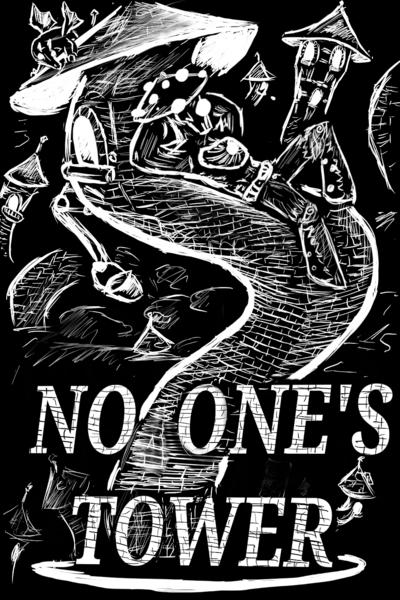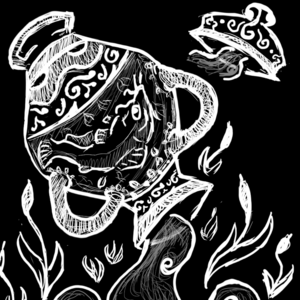Lut paused her remarks and took hold of the pot with her two left arms and moved closer to the patch of vegetables. She lifted the pot, her claw sliding in its handle. Tapping rhythmically on the side of the pot, Lut brought a faint glow out of the symbols etched in the clay. The grooves along the pot began to resonate vividly, unveiling a painted catfish gliding effortlessly around the pot’s circumference. From inside the pot a weak echo started humming – the sound of a brook flowing and swirling into a pond. She guided the flowing water, spreading it to each sprout in the whole row, yet there was no sign of this well drying up. Lit tilted back the pot and tapped its runes again. Ending the river’s sputter promptly, with a few last drops falling from the pot’s rim. The lively catfish faded away back into the clay surface as well. “Did a river just pour out of that pot?” gawked Mortigus, his bewildered gaze meeting Lut’s. “Would be a true miracle if it could,” chuckled Lut, amused by Mortigus’ childlike wonder. “It’s an enchanted Aquarius pot; you leave its lid in a river or some groundwater basin, tap the pot just right, and the lid feeds the water into the pot.” “Still plenty miraculous if you ask me,” remarked Mortigus. “Fair enough. Not like I know how it truly works; humans likely unravelled and adapted the creations of those fish-folk, or something along those lines. Aquarius pots apparently were a rarity even in the goold ol’ days; I can’t thank my elders enough for keeping this heirloom intact for so long,” acknowledged Lut while getting up and straightening her back a little, causing the sections of her thorax to make a clicking sound. She then dusted off her kerchief and carried the pot along. Mortigus was full of questions, but his eye moved a bit lower, now noticing around her neck the same weird stone he saw her using yesterday. Part of a necklace around her neck and tucked under her kerchief, the stone seemed to course with magic, a faint glow accompanying each word spoken by Lut. Withered engravings depicting a human mouth and a couple of ears adorned the stone. Likely another magical item, it stirred Mortigus’ curiosity—a reaction Lut quickly caught onto. “Ogling the Diplomat pendant now, aren’t you? First one you’ve seen, I’d reckon.“ asked Lut, receiving an affirmative nod from Mortigus. “You don’t have much experience with magical items as far as I can tell.“ “It’s beyond what Arbero managed to teach me. It feels quite hard to grasp these things without just accepting them at face value. I don’t know how most of the world works,“ admitted Mortigus. “Heh, Arbero thought you could get by with just Essence," snickered Lut as she continued tending her garden. “Or that was the priority, which I can understand. But it’s useful to learn as much about the true spectrum of magic. At the end of the day, all magic is rather simple; at least its origin is. We kind of share the same wood but make different tools. Though the wood comes from different trees, they're all trees in the end. There’s a better definition for this, I’m sure. I have it on the tip of my mandibles, I swear. Agh, the books explain it so clearly, and I like their phrasing a lot. I’m so annoyed I can't recall it properly.” Lut moved the water pot back to a hole in the ground that was storing other gardening tools, though their handles took bizarre shapes, more fit for claws than hands. As she invited Mortigus back to the burrow, they descended into the tunnels and headed to the deepest section, where Mortigus’ glowing fungi did not reach. The air grew thinner, though it proved of little difficulty for the two, unlike the growing darkness in which Mortigus stumbled. He paused for a moment, glancing at Lut as he reconsidered the situation. A bit delayed, Lut sensed that she left him behind and urged him to hurry up. He relented and trailed after her up a gently twisting slope that led upwards into a dry, cool room where the air hung a bit stale. A few small vents allowed streams of fresh air to seep into the chamber, and the only light peering in was the faint glow of Mortigus’ eye and chest core. “Oh, you probably can’t see in the dark; I should find my firefly lamp. Or you could make some of those glowing mushrooms. Keep them only to the roof though, please!” Mortigus followed Lut’s words and gently illuminated the room from above, a hypnotic glimmer unveiling the chamber adorned in cloths hanging over shelves and a desk fitted in the back with what seemed like writing tools and a monocle. With great care, Lut began to lift the cloths on the shelves and peek under them one by one until the fourth proved lucky, as she snatched a thick book from under it. She clumsily brushed off the dust on the desk with her second, thinner set of arms and placed the book down. Mortigus stepped next to Lut, staring at the worn leather cover of the book. The etched characters bore a resemblance to the alphabet of his mother tongue, yet the words themselves weren’t only barely legible but outright unfamiliar to him. “Good, here it is, <<What makes and breaks Magic>>. Haven’t opened it for over a year,” confessed Lut while ruffling the pages eagerly. “That’s the phrase, finally! What concerns magic are two aspects: the means of acquiring it and the means of utilising it. Though it sounds rudimentary, neither aspect is a straightforward matter, for they depend not only on knowledge but also on the biology of its caster.” “Arbero did describe Essence similarly, calling it something essential, integral to our being, such as the blood and the heart themselves,” stated Mortigus. “That must be the magic of the mushroom folk then. You’re part of a very old species, you know, and so is your whole civilisation. You’d be the great-grandfather in the house, and humans would be just toddlers. Chitindras would probably be like your grandchildren, I suppose. Oops, I’m getting sidetracked. What you must know is that usually access to magic is made through contracts. Chitindras like me, humans, and other of the young species must make direct deals with the gods,” she explained, adding air quotes to the word “direct” by flicking her antennae. “People call them Divine or Godly contracts, and they’re rather complex. You usually need multiple of these to do something truly grand. Meeting certain conditions, inscribing specific symbols—standard methods for magic which I find rather vague. Most view the knowledge of how to create and seal a contract with a particular god as a highly guarded, invaluable secret. Details are hidden, misinformation is spread; it’s crazy how much of the concrete information is obscured even in this book.” “I don’t really remember creating any contract of the sort,” stuttered Mortigus, tending to a mushroom growing around where his arm had been severed. His mind drifted shortly back to the plague doctors and their hands pressing into his flesh. What might they have been trying to achieve with him, through him? Fortunately, Lut’s retort quickly snapped him back into the conversation: “Probably because you were born with them, thanks to your ancestors. Ancient species don’t divulge their methods, though. Can’t allow everyone to be able to make spores for some reason.” Lut widened her jaw, as It all comes down to Essence being the way magic manifests inside you; it’s second nature; maybe outright a body part for you. Must be pretty intuitive, right? While incredibly useful, there are restrictions, as you can imagine. You’re stuck with it. Your body is too strictly adapted to your inherent Essence to the point of rejecting other forms of magic, including trinkets like this Diplomat pendant,” she said, nudging the stone on her neck. “Essence is a fitting name after all.” “What does that pendant do exactly? Would I even be able to use it, for example?” “It wouldn’t be impossible. This pendant simply translates most of my speech so we can understand each other. I know a bit of Meniahan, but I really struggle to speak it. The item picks up my voice and my intents and transforms them into a language of my choice. It even translates whatever I hear, though I could complain about the delay. Using it consumes a bit of my energy, though. My parents taught me how to attune to magic items, kind of like learning a specific sensation or reflex and figuring out how the item responds to your body and will. You’ll have to figure out how to talk to them in their own language.” “Why would magical objects behave like that?” “Asking for a lot of answers from an old, solitary dame, aren’t you?” sassed Lut. “Even if I was able to read all the books here, I would still be clueless. I think you can tell that this isn’t an exact science for me either. Anyway, we could start our first lesson now, if you’re not hungry, that is.” Mortigus showed interest in beginning the lesson right away, and Lut obliged. She raised the pendant over her head and carefully over her antennae, stretching its elastic cord made from plant matter. “The Diplomat pendant requires one to wear it near their vocal cords; it wasn’t made with a wide range in mind,“ she explained, hovering the pendant next to her neck. When she would move it too far from herself, the feeble light of its runes would fade, and her speech would become sloppy, a haphazard mix of languages Mortigus struggled to keep up with. Then she relinked the pendant to her neck, continuing her demonstration: “And now I can speak Meniahan fluently again. The pendant doesn’t do everything by itself; it requires you to understand the original language to some extent. After all, a language is not just a bundle of words; it needs context, a certain way of thinking related to the speakers of that language. You gotta perceive the subtexts and intentions. The translation spell can’t account for it all.” “It’s more of an aid then,” concluded Mortigus. “Correct. But it also overcomes a lot of biological barriers: it compensates for the sounds I find hard to make and for the weak hearing in my left ear. You just need to learn the fundamentals of the desired language beforehand, which I admit is a hassle,” she quipped. “That is nonetheless pretty handy,” noted the mycolian. “Why that specific name for it, though?” “Oh, it’s just the customary name for these stones, as my grandparents told me. They actually received this pendant from a certain acquaintance of yours.” Mortigus was immediately intrigued. “A long time ago, Arbero visited these parts of the country and met the Chitindras hiding around. They helped us by nurturing the mushrooms we feed on. They also left a few things in my ancestor’s care, one being the Diplomat pendant. Most retellings of this describe this stone as an item diplomats would wear when visiting other kingdoms and rulers. Arbero probably didn’t need it anymore, I guess.” A curious realisation struck Mortigus. He knew Arbero had visited this burrow, but why had they left their belongings behind? Their mushroom home in the forest had been notably sparse, and now he understood why. But perhaps the more pressing question was whether they had abandoned the Dipimat pendant and other items because they no longer needed them—or because they couldn’t use them. Lut poked Mortigus’ arm to get back his attention. “The monocle on the desk had also belonged to Arbero, a companion piece to the pendant.” She pushed closer the monocle, a golden plate serving as its handle, standing out thanks to the intricate engravings of an eye and hand. “It let’s you read and write in other languages, granted you follow the same rules as for the pendant. If you pick up some rudimentary Dokan from me, you should be able to use them and read even that hunter’s journal. Though it might take a long while…” Both acknowledged the lengthy path Mortigus faced in studying a new language and learning to wield these magical items. Mortigus was giving in to his impatience, feeling his goal at the beginning of his journey sinking away. As animated as she was when she presented her book, Lut shifted into more pragmatic thought, deliberating how she could help Mortigus best. She tried to lighten the atmosphere by presenting a few more of the books collected and preserved by her elders, such as “The Way of the Soil", “Writings of the Wonder Wall”, “Fables for scaredy crickets” and “We who are defined in ink”. Surprisingly, the latter happened to be written in Mortigus’ mother tongue, and he requested to read it for later in the “guest room”. Lut consented to it, on the condition he would take great care of it. She didn’t have experience as a librarian, but she was bound to learn the role quickly. As Lut was shifting through the spines of old books, Mortigus was carefully fidgeting with the monocle and observing it closely. As he just learnt, such items had something akin to their own will, understanding them as part of the procedure of connecting to them and using them. Yet his attempts to pour his Essence into the handle or the lens were futile, like talking to a wall. In Mortigus’ case, the ground walls would at least talk back, while the uncanny coldness of the monocle kept quiet. Suddenly, Lut came upon a bundle of hard sleeves made of reflexive chitin, just like her carapace. She firmly lifted them and placed them on the desk, slowly opening each and checking their insides. She finally stopped and revealed to Mortigus a crusty parchment imprinted by iron gall ink, its lines depicting the map of what seemed to be a part of the world, yet nothing similar to the Wonder Wall was visible. “This is a map, right? Are the edges themselves showing the Wall?” asked Mortigus. “Couldn’t be, it’s from a century before the Wonder Wall itself! The human territories are just packed here in the southwest corner, see?” explained Lut. “The world sure seemed bigger back then. I also got a map that details the regions encompassing Doka and Meniah, as promised. But it’s worthwhile seeing the bigger picture first, I’d say.” Mortigus' eye fixed on the parchment, drawn in by the uneven inked shapes, smudged borders, mountain ranges, and what appeared to be vast lakes in the north. Tracing the map’s contours felt surreal—an eerie glimpse beyond the impenetrable Wonder Wall, the edge of the known world. A part of him had always doubted Arbero’s notion of a far greater world existing, but the blurry lines of the world were now getting carved deeper and deeper into his mind, imagining future days from the moulds of fragmented pasts. The fantasy of it all was becoming more real than ever, as his glow reflected on Lut’s body and onto the parchment. Though, what caught his eye was the lack of writing. He hovered his finger over the middle, and faint letters in an unreadable language emerged briefly.
Aquarius Pot










Comments (0)
See all